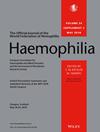Impact of Family History of Haemophilia on Diagnosis, Management and Outcomes in Severe Haemophilia
Abstract
Introduction
Patients with severe haemophilia A (HA) with no family history of haemophilia will be diagnosed upon their first bleeding event.
Methods
Herein, we studied the effects of lack of family history in HA and the subsequent delay of diagnosis on bleeding pattern and early treatment, as well as on the risk of inhibitor development. For this purpose, data on 1237 severe HA patients with known family history (“positive” or “negative”), born between 2000 and 2022, were collected in 29 participating centres.
Results
At diagnosis, 45.9% (554/1208) of patients had a positive family history of HA and 54.1% (654/1208) had a negative family history. A positive family history significantly shortened the time to diagnosis (8 months) and the treatment initiation (2 months). Prophylaxis was more frequently the first treatment in those with a positive family history compared to the negative family history group (21% vs. 13%). Bleeding was the main reason for first exposure day (ED) in both groups, but less frequently in the family history group than in those without a family history (67% vs. 80%). Positive family history was associated with fewer peak treatments at first five EDs (12% vs. 16%). In non-inhibitor patients, bleeding occurred earlier in those with positive family history (9.2 months vs. 10.6 months). The inhibitor incidence was similar in both groups (33% vs. 30%), and a positive family history was associated with earlier inhibitor development (13 months vs. 15 months).
Conclusion
The majority of patients presented without a family history of HA which led to a delayed diagnosis and treatment initiation.


 求助内容:
求助内容: 应助结果提醒方式:
应助结果提醒方式:


